Egypt’s Olympic volleyball duo compete fully clothed in Paris – and condemn hijab ban for French athletes
The Egyptian Olympic volleyball duo competed in Paris dressed provocatively, but subsequently criticised the ban on French athletes wearing headscarves.
After Egypt’s 2-0 defeat to Spain, the pair were embraced in long-sleeved shirts, leggings and headscarves, while the Spanish duo celebrated their victory in tight red bikinis and matching sun visors.
The bold move comes after France banned its team members from wearing headscarves. The country’s sports minister, Amelie Oudea-Castera, said the move was taken to respect the principles of secularism.
Despite this, Abdelhady and Elghobashy took to the volleyball court wearing their religious headscarves and later condemned the ban.
The Egyptian Olympic volleyball duo, fully hijab-clad, took on their bikini-clad Spanish opponents
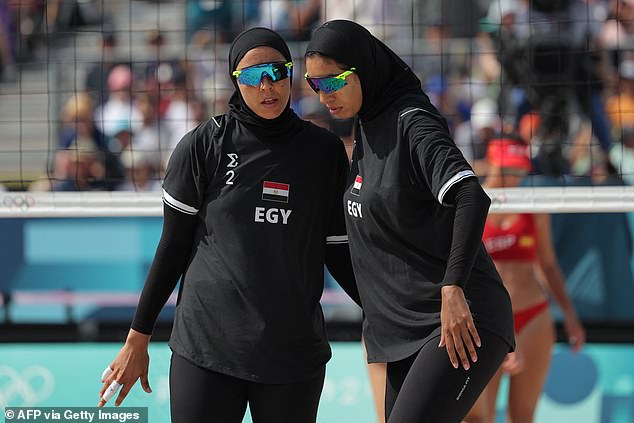
Egyptian athletes Marwa Abdelhady and Doaa Elghobashy conspicuously wore an all-black outfit, along with their religious headscarves – an item of clothing banned for French athletes
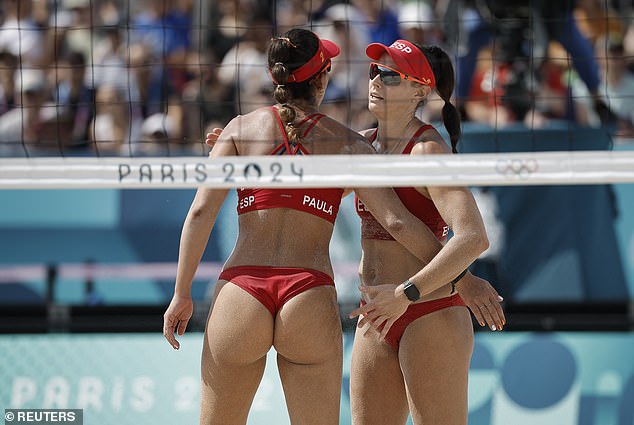
Liliana Fernandez Steiner and Paula Soria Gutierrez from Spain wore red bikinis during the competition
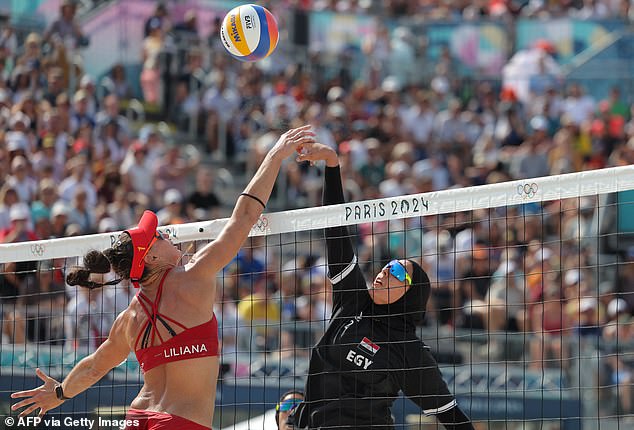
The images have gone viral on social media due to the stark contrast in outfits
“I want to play in my hijab, she wants to play in a bikini – it’s okay if you want to be naked or wear a hijab. Just respect all different cultures and religions,” Elghobashy said. Express.
‘I’m not saying you have to wear a hijab and you’re not saying I have to wear a bikini. Nobody can tell me how to dress.
“It’s a free country, everyone should be able to do what they want.”
Amnesty International and 10 other organizations wrote a letter to the International Olympic Committee in June asking it to overturn the ban, warning that it led to “discrimination” against Muslim athletes.
“Women and girls in France who wear a headscarf are prevented from participating in several sports, including football, basketball, judo, boxing, volleyball and badminton, even at youth and amateur levels,” the letter said.
‘The ban on headscarves in sports has led to many Muslim athletes being discriminated against, made invisible, excluded and humiliated. This has led to trauma and social isolation. Some have left or are considering leaving the country to pursue sports elsewhere.
The human rights organization subsequently strongly criticized the host country of the Olympic Games for not lifting the ban.
“The ban on French athletes wearing a headscarf at the Olympic and Paralympic Games is a farce for the claim that Paris 2024 will be the first gender-neutral Olympic Games. It also exposes the racist gender discrimination that underpins access to sport in France,” said Anna Błus, Amnesty International’s researcher on women’s rights in Europe.
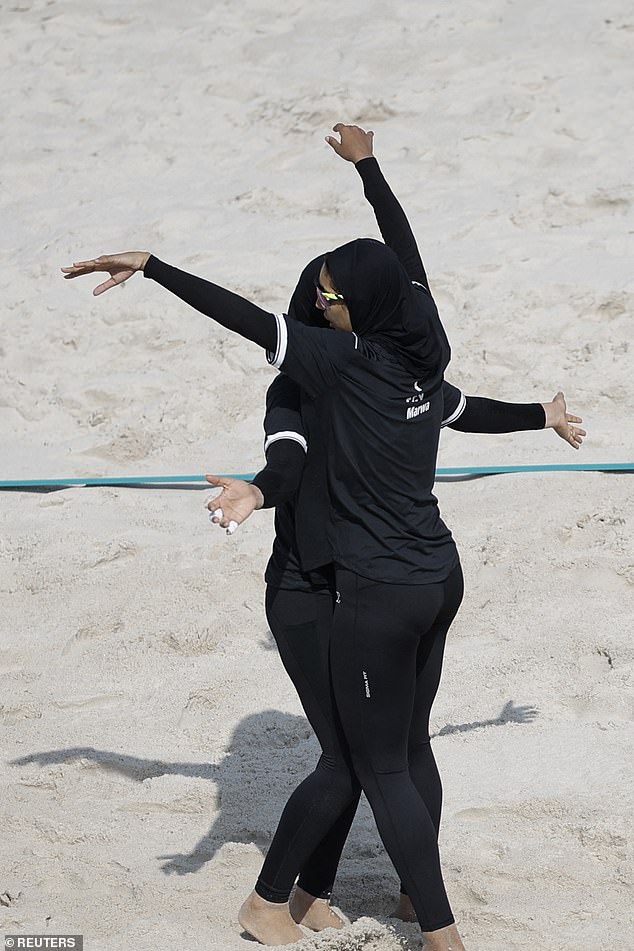
Abdelhady and Elghobashy hugged after loss to Spain
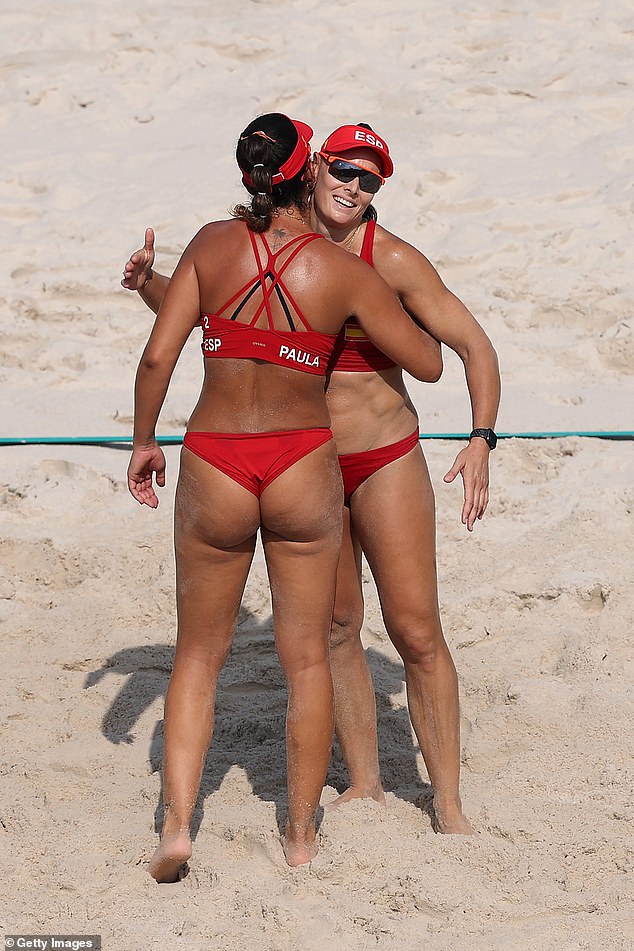
Steiner and Gutierrez showed off their toned abs after winning the volleyball match against Egypt
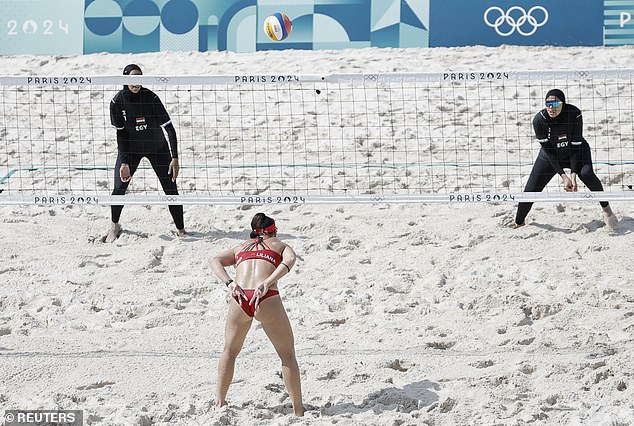
“I’m not saying you have to wear a hijab and you’re not saying I have to wear a bikini. Nobody can tell me how to dress,” Elghobashy said
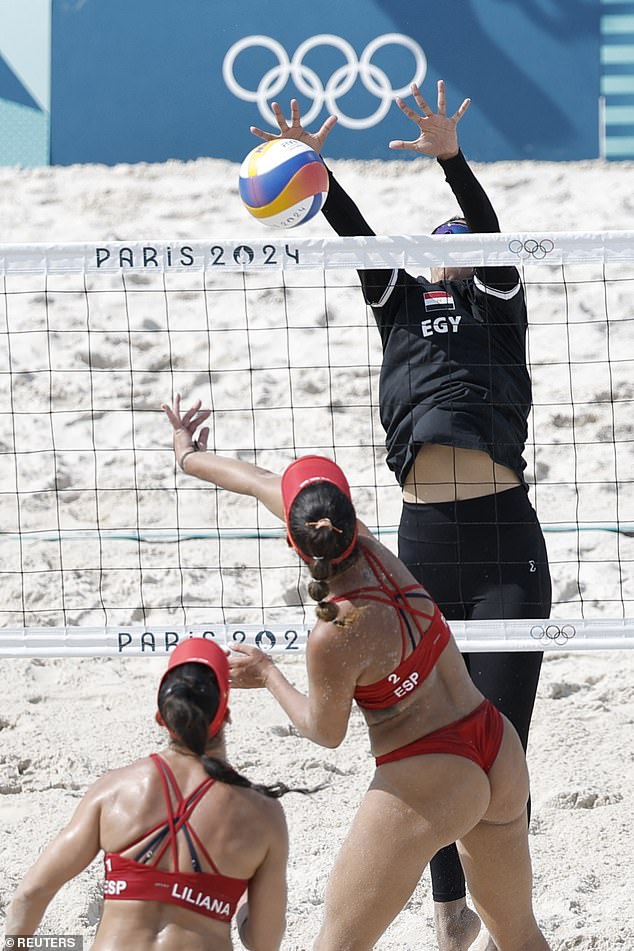
A ban on wearing a headscarf in football was introduced in 2006, in basketball in 2022 and in volleyball in 2023.
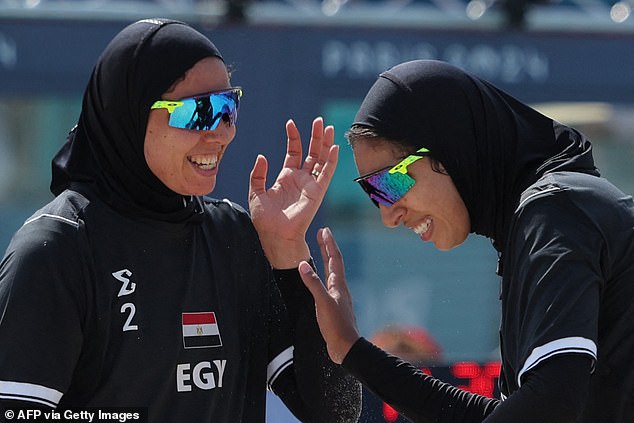
“The hijab is a part of me,” Elghobashy said
Elghobashy believes allowing hijabs, which will also be allowed in the athletes’ village, offers “freedom for everyone” and hopes the focus will shift from what they wear to their performance.
“I like to play with a hijab, not a bikini,” she said, calling the International Volleyball Federation (FIVB) rule change a sign of “respect”.
You might not like it for another girl [it] – it’s okay for you. It’s freedom, I felt comfortable and good.
‘The hijab is a part of me. It’s not [that way] for everyone.’
This came after French sprinter Sounkamba Sylla said on social media a few days before the 2024 Games began that she would not be allowed to participate in the opening ceremony because of her headscarf.
“You have been selected for the Olympic Games hosted by your country, but you cannot take part in the opening ceremony because you wear a headscarf,” Sylla wrote on her private Instagram account, according to The Associated Press.
Until the 2012 Olympic Games, female volleyball players were required to wear a bikini – with the bottom part of the bikini no wider than 7 cm from top to bottom at hip height – or a one-piece swimsuit.
But the FIVB stepped in and made it clear that it wanted to open up the sport to players and change the rules to accommodate more athletes.
According to Amnesty International, wearing a headscarf is banned in French sports at all levels, including amateur and youth sports. The ban even extends beyond the Olympic Games.
There is no national law or policy banning headscarves in sports, but individual sports associations have their own rules banning the religious headscarf.
Football, basketball and volleyball are some of the sports where they are banned.
A ban on wearing a headscarf in football was introduced in 2006, in basketball in 2022 and in volleyball in 2023.
‘We have documented over the years — [for] “For about 20 years, measures have been continuously introduced to restrict the rights of Muslim women,” Blus said of France.
“There has definitely been an increase in these types of measures in different areas of life over the last 20 years,” she added.
